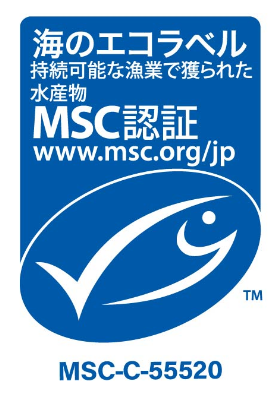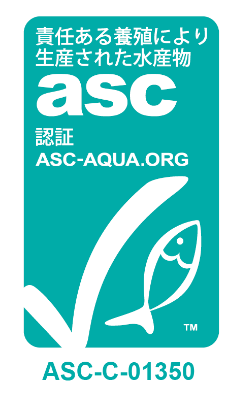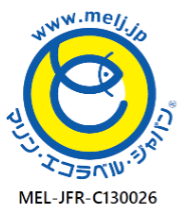Sustainable use and procurement of fishery resourcess
Awareness of ethical consumption is on the rise worldwide, and momentum is building in Japan as well to procure and sell sustainable seafood. TOREI aims to achieve sustainable procurement by promoting the procurement of raw materials produced using sustainably produced methods and eliminating overfishing and IUU fishing (※).
Tuna Procurement Guidelines
As a company that handles seafood, TOREI has been taking steps to procure sustainable seafood and not handle seafood related to IUU fishing (※). In particular, with regard to tuna, which is often viewed as problematic due to environmental resource issues, international overfishing, and social human rights issues, we established tuna procurement guidelines in August 2022 with the aim of contributing to solving these issues. We will continue to promote efforts in accordance with these guidelines from the perspectives of both long-term business continuity and a stable supply of seafood for future generations.
※IUU fishing: Refers to fishing that is conducted illegally, unreported and unregulated. Poaching, overfishing, and inaccurate reporting of fishing practices are major causes of the deterioration of the marine environment and the decline of fishery resources, and in recent years human rights issues have also become a concern. TOREI has been working to prevent the handling of seafood produced by IUU fishing, and will further strengthen this system by conducting supply chain investigations and formulating procurement policies.
- Tuna Procurement Guidelines
-
We recognize that a company cannot survive if it does not take the environment into consideration, and we are committed to contributing to the development of a better society while proactively and sincerely working to protect and improve the global environment in all of our corporate activities, including purchasing, processing, manufacturing, storage, logistics, sales, and services. We recognize that the safe and sustainable use of marine resources is the foundation of our business activities. With the aim of procuring raw materials that have been produced and procured through sustainable methods and contributing to solving issues such as international overfishing, IUU (illegal, unreported and unregulated) fishing, and human rights violations, we have established the following procurement guidelines for tuna (Atlantic and Pacific bluefin tuna, southern bluefin tuna, bigeye tuna, yellowfin tuna, albacore tuna, and skipjack tuna) and will promote initiatives based on these guidelines.
A) Environmental aspects of tuna procurement policy
With a view to both ensuring long-term business continuity and a stable supply of seafood for future generations, we will be taking the following steps to procure tuna in a sustainable manner based on scientific evidence.
<Wild Caught Tuna>
- 1. Working with suppliers to promote and further develop the standards for sustainable fishing for wild tuna set by certification programs accredited by the Global Sustainable Seafood Initiative (hereinafter "GSSI") (hereinafter "GSSI Accredited Certification") within the seafood industry.
- 2. Actively cooperate with companies and suppliers seeking GSSI-recognized certification to help them introduce Fishery Improvement Projects (hereinafter referred to as "FIPs") based on scientific and objective plans.
- 3. In order to avoid the risk of procuring tuna through IUU fishing, as defined by the Food and Agriculture Organization of the United Nations, the United Nations must establish interoperable traceability by incorporating key data elements recommended by the Global Dialogue for Seafood Traceability (GDST).
- 4. Regarding transshipment at sea, we will support the implementation of a robust monitoring and supervision regime based on international treaties.
- 5. Support fishing vessels that comply with the international treaty requiring observers to be on board longline vessels, and support increasing the onboarding rate and strengthening the onboarding management system through electronic monitoring, etc.
- 6. Provide necessary cooperation to tuna regional fisheries management organizations and relevant government ministries and agencies in order to achieve these procurement guidelines.
- 7. Create opportunities for the exchange of opinions with stakeholders, such as NGOs, to realize sustainable procurement of wild tuna.
<Farmed Tuna>
- 1. Support and actively cooperate in establishing standards for farmed tuna through GSSI-accredited certification.
- 2. Actively cooperate with farming suppliers aiming to obtain GSSI certification so that they can carry out their activities based on scientific and objective plans.
- 3. Establish interoperable traceability and prepare key data elements recommended by the GDST in order to avoid handling tuna caught through IUU fishing, as defined by the Food and Agriculture Organization of the United Nations.
- 4. Provide necessary cooperation to tuna regional fisheries management organizations and relevant government ministries and agencies to achieve these procurement guidelines.
- 5. Create opportunities for the exchange of opinions with stakeholders such as NGOs to realize sustainable procurement of farmed tuna.
- 6. Actively cooperate to obtain GSSI certification for feed resources used in farming.
B) Social aspects of tuna procurement policy
We believe that respecting human rights is an important element of doing business around the world. In order to address IUU and human rights issues in the tuna supply chain and to realize a responsible supply chain, we will work with various stakeholders, including suppliers, in accordance with the policies of Mitsubishi Corporation, our shareholder, and take steps to resolve the issues.
Human Rights: Policy (from Mitsubishi Corporation website)C) Initiatives based on these guidelines
We will take the following steps to effectively realize the above procurement policies A) and B).
Attempt Progress Future policies The percentage of GSSI certified products among the tuna products procured by our company will be 30%. When guideline targets were set in 2022, the proportion of products certified by GSSI was approximately 1%, however, due to increased purchases from purse seine fleets certified by MEL, the figure increased to approximately 20% in FY2024. We will continue our efforts to achieve a 30% proportion of GSSI-certified products by 2030. Actively support suppliers implementing FIP. We have started specific discussions with suppliers currently implementing FIP to obtain the GSSI-accredited certification. We have also begun efforts with suppliers that have not yet implemented FIP to recognize risks and challenges through environmental and human rights audits conducted by our group and to jointly study and implement improvement measures. We will aim to obtain certification together with suppliers currently implementing FIP and identify risks and challenges through audits and jointly implement improvement measures with suppliers that have not yet implemented FIP. Organize and confirm the status of collection of key data elements in accordance with GDST standards. We sorted out and confirmed the status of collection of key data elements in 2023. As a result, while it was confirmed that some data elements had already been collected or could be collected, others were found to be difficult to collect through individual companies' efforts. We will continue to discuss with suppliers to accurately comprehend changing market needs and ensure the required traceability. Conducting voluntary risk assessments of our tuna suppliers. We conducted a questionnaire survey on environmental and social efforts for all of our primary tuna suppliers and some of secondary suppliers (fishing vessels)..
In addition to the above, we engaged a third-party organization to design our own risk assessment tool for more detailed surveys, referring to the SRA standards and relevant domestic and overseas laws and regulations. By using this assessment tool, we conducted one third-party audit (external audit) in FY2022, one in FY2023, and three in FY2024. From FY2024, we also started to conduct in-house risk assessments (in-house audits) using the above-mentioned tool and the total number of audits conducted so far has reached 30.
Based on the results of these surveys, we developed improvement plans with suppliers and made efforts towards improvements.We will continue to conduct supplier surveys and external and in-house audits and follow up on improvement plans for each supplier to improve and promote environmental and social efforts in the supply chain. By conducting external audits of our tuna suppliers, we will identify risks and issues in the supply chain, share the audit results with relevant suppliers, and jointly consider and implement improvement measures. In cooperation with Mitsubishi Corporation, we will participate in dialogues with relevant government ministries, suppliers, NGOs, and other stakeholders. We attended workshops hosted by Mitsubishi Corporation in South Korea and Taiwan and shared with suppliers the issues identified through the above-mentioned risk assessments and audits.
We also actively participated in platforms organized by multi-stakeholders and exchanged opinions.We will work with suppliers to study and implement improvement measures and continue to organize similar workshops to share them across the industry. We will also actively take part in multi-stakeholder platforms on labor rights issues in the fisheries industry and continue to promote improvements in human rights initiatives. In cooperation with Mitsubishi Corporation, we will work with suppliers to promote and develop certification programs for the realization of responsible supply chains and to create an environment that provides "decent work" as defined by international treaties. Mitsubishi Corporation established and started operating a grievance mechanism in 2023. In FY2024, we prepared posters to be displayed on fishing vessels towards implementation in our fisheries business and started discussions to display the posters on fishing vessels. We will continue to work with suppliers and other stakeholders to create an environment that provides "decent work" as defined by international treaties. That's all
Updated:Risk assessment(in-house audits)
We exchanged opinions with the owners of the fishing vessels from which we purchase frozen tuna, and interviewed the captains of the fishing vessels owned by the company.
Key challenges faced by the seafood industry include the conservation of marine ecosystems to ensure the sustainable use of seafood resources and the protection of workers' human rights. As part of efforts to address these challenges, we utilized our original checklist, developed in collaboration with a third-party organization, to conduct interviews with vessel captains. The discussion focused on environmental aspects (e.g., catch volume) and social aspects (e.g., labor management and health and safety practices).
We learned about the vessel owner's initiatives such as crew assignments and training programs thoughtfully designed to prevent discrimination and harassment based on crew members' religious backgrounds and native language, improved accessibility to sanitation facilities and drinking water, and fishing training to crew members aimed at conserving marine ecosystems. Furthermore, through an onboard inspection, we were able to verify that these initiatives were being properly implemented.Onboard facility inspection 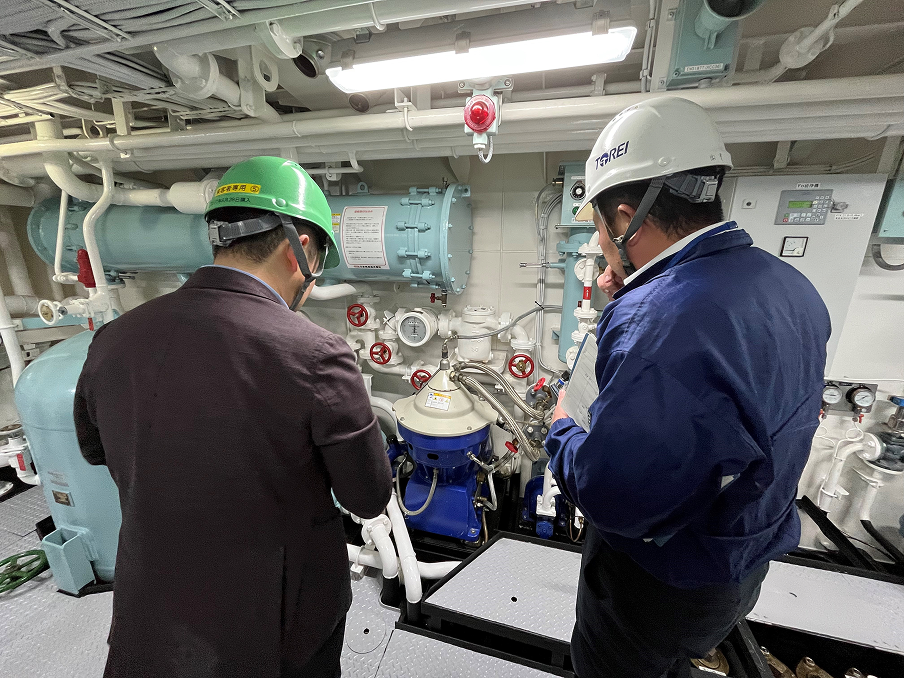
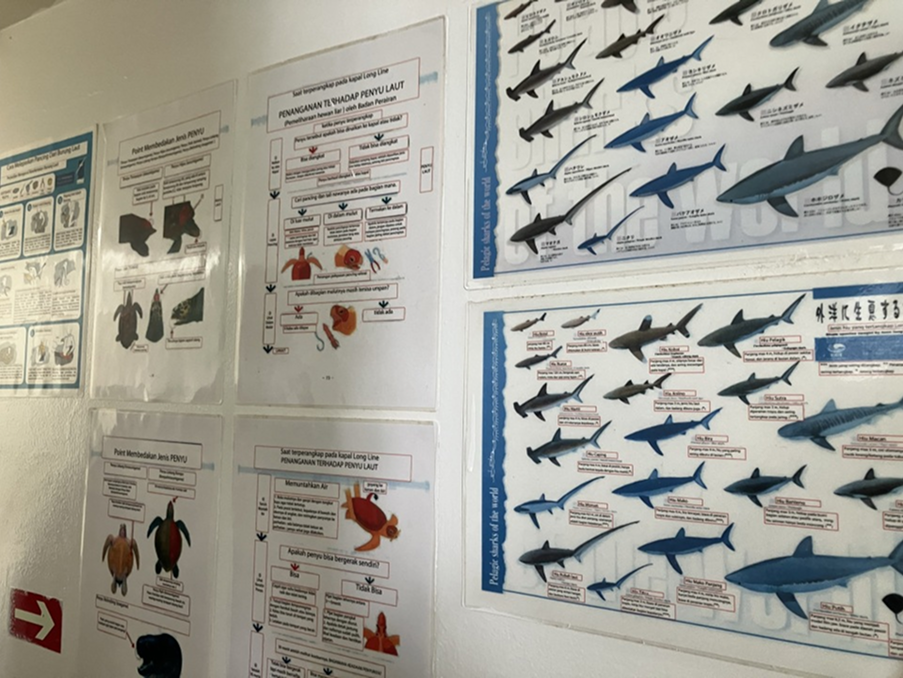
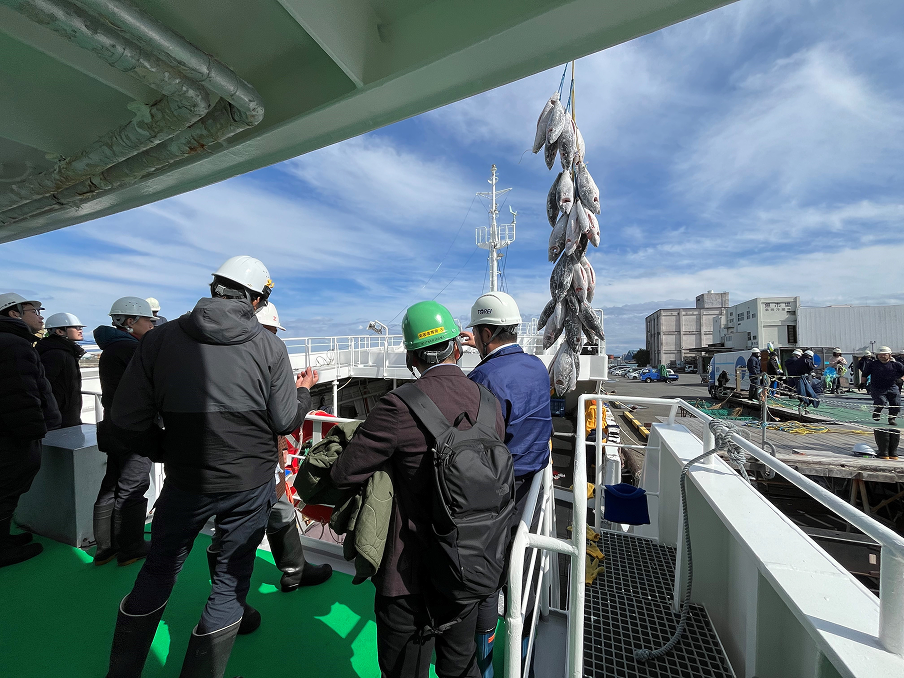
- Statement Concerning Transshipment of Tuna
-
Our group company, MRS Co., Ltd. (hereinafter referred to as MRS), is engaged in the business of ultra-low temperature tuna transport vessels that travel to fishing grounds around the world to transship tuna from fishing boats and transport them by sea. Tuna fishing is one of the most important fisheries in the world, and MRS's business of properly transporting tuna caught by fishing boats plays an important role in the supply chain. We believe that it is important to fulfill our social responsibility by handling tuna caught in a sustainable manner.
The transshipment of tuna is regulated in each region by the Tunas Regional Fisheries Management Organization (RFMO). In addition, to prevent the transport of catches resulting from overfishing and illegal, unreported, and unregulated (IUU) fisheries, it is required to have on board an observer appointed by the RFMOs, when transshipping tuna to carrier vessels. The observer's duties include verification of each fishing vessel's fishing license, the transshipment permit from the government of the vessel's country of registry, the species/quantity of the catch, whether the catch is caught appropriately, etc., and submission of the data to the respective RFMOs to ensure that the fishery is operated in accordance with international rules. On the other hand, it has been pointed out that maritime transportation involving the transshipment of tuna is also engaged in the issues of overfishing, IUU fishing, and human rights violations. Considering this external environment, MRS will promote efforts not to transport catches originating from overfishing, IUU fishing, and human rights violations, from the perspectives of both long-term business continuity and stable supply of tuna to future generations, while in compliance with international rules.
Handling of certified products
Certification serves as a measure of sustainability for seafood products, proving that they comply with certain standards. Currently, certified products have not yet fully penetrated the Japanese market, but there are an increasing number of opportunities to see products with the "Fishery Eco Label," which indicates that the product is certified, especially at major mass retailers, and demand is expected to increase in the future. TOREI also plans to expand its "certified product procurement capabilities" and "domestic supply chain."
Fisheries eco-labels "MSC certification", "ASC certification", "MEL certification"
TOREI obtained MSC and ASC CoC (Chain of Custody) certification(※) in 2016, and Marine Ecolabel Japan (MEL) CoC in November 2024, and has begun handling certified products. These certifications require that not only the fishermen and aquaculture producers who produce the seafood be certified, but also companies involved in the supply chain up to the point where the certified seafood products reach consumers.
*CoC certification: CoC certification is a requirement for all businesses that have ownership of certified seafood throughout the supply chain, from when the certification label and logo are affixed to the certified seafood to when it is finally packaged for consumers. CoC certification indicates that proper management is being carried out to prevent the mixing of "certified seafood" and "non-certified seafood" during the processing and distribution process.
* The supply chain for final packaging of products with certification labels and logos for consumers at retail stores
Supply Chain Research
We conduct supply chain surveys of our business partners that include questions about their efforts and responses to human rights, social, and environmental risks. This survey utilizes the platform of our parent company, Mitsubishi Corporation, to identify products that are deemed to have high environmental and social risks as "survey target products."
With regard to the tuna and shrimp that are the subject of the survey, which are among the products handled by TOREI, Mitsubishi Corporation has set up a grievance mechanism to receive consultations from external stakeholders regarding cases in which the business activities of the Mitsubishi Corporation Group, including our company, have had or are concerned may have a negative impact on human rights or the environment.

